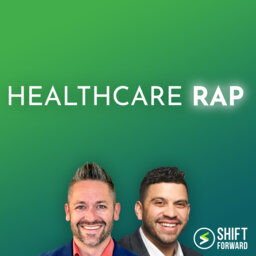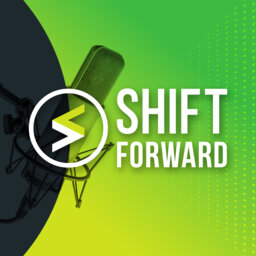Healthcare Rap
Healthcare Rap is the leading podcast about consumer-centered care, a.k.a. how the frontiers of digital, retail, and traditional care can work togethe… Aledade’s $1 Billion in Primary Care Savings27:57
Aledade’s $1 Billion in Primary Care Savings27:57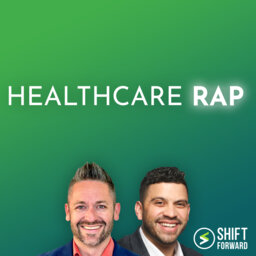 Can Consumers, Medicine & Digital Health Coexist? (#252)33:41
Can Consumers, Medicine & Digital Health Coexist? (#252)33:41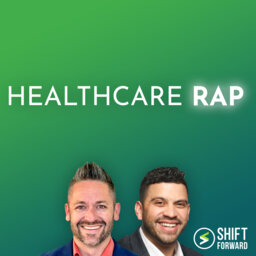 An Inside Look at Epic Cheers32:06
An Inside Look at Epic Cheers32:06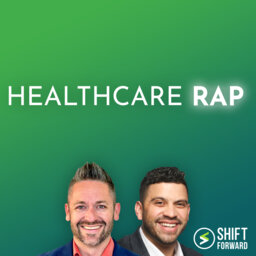 The State of Consumer Transformation (250th episode)43:53
The State of Consumer Transformation (250th episode)43:53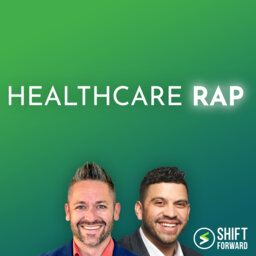 A Profile of Consumerism Leadership36:34
A Profile of Consumerism Leadership36:34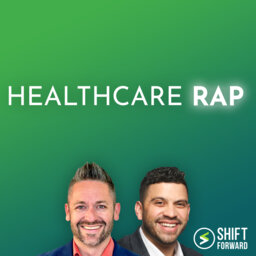 Priority Health and Kroger Health’s Vital Partnership27:27
Priority Health and Kroger Health’s Vital Partnership27:27 2023 Predictions Series: Jared, Zain & James36:09
2023 Predictions Series: Jared, Zain & James36:09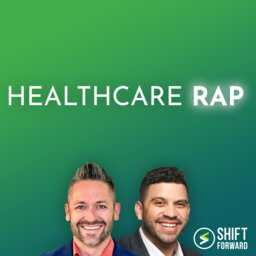 2023 Predictions Series: Paul Keckley & Chris Hemphill31:11
2023 Predictions Series: Paul Keckley & Chris Hemphill31:11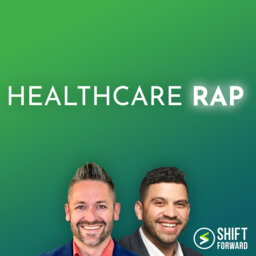 2023 Predictions Series: Jane Sarasohn-Kahn & Amy Heymans41:55
2023 Predictions Series: Jane Sarasohn-Kahn & Amy Heymans41:55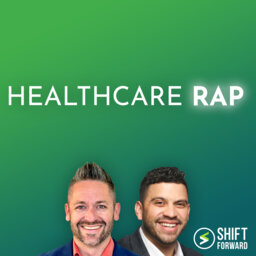 2023 Predictions Series: Sara Vaezy & Barbara Casey34:31
2023 Predictions Series: Sara Vaezy & Barbara Casey34:31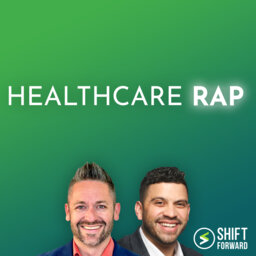 Geonetric, Tweet Chats, and Consumer Health's Bleeding Edge35:31
Geonetric, Tweet Chats, and Consumer Health's Bleeding Edge35:31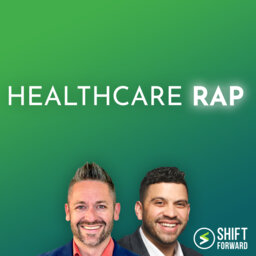 ChenMed’s CMIO On How Tech Enables Transformative Care22:42
ChenMed’s CMIO On How Tech Enables Transformative Care22:42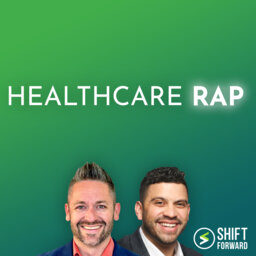 3 More Podcasts For Healthcare Leaders37:20
3 More Podcasts For Healthcare Leaders37:20
The 2023 Predictions Series wraps up with Jared, Zain, and James offering their top 6 predictions for consumer transformation in the new year and beyond, followed by a lightning round of movers and shakers. Which trends are capturing their attention, which players do they think will make big moves, and will the sky keep falling?
All that, plus the Flava of the Week about the breakthrough for real change. How will we bury the age-old excuses and have a more productive dialogue about improving the consumer experience?
This show is produced by Shift Forward Health, the channel for change makers. Subscribe to Shift Forward Health on your favorite podcast app, and you’ll be subscribed to our entire library of shows. See our full lineup at ShiftForwardHealth.com. One subscription, all the podcasts you need, all for free. (#247)
The show is here.
Yo, our mission is clear. It's time to change health care. Have no fear. Today is the day. This is the hour. Together, you know we've got the power. Drop the silos. We're all the same team experience. This is tech and marketing. How can anyone be satisfied with the way things have always been? Yeah. We tried. So join us now. Join the revolution. Consumer first.
Health is the evolution status quo for like, status. No. Yeah. This is the health care rap y'all.
New choices, new platforms, new care models in the health care of tomorrow. Consumers win. But who will design it? What will it look like and how long will it take? We are here to answer those questions with some provocative thinking about how to create the health care that people actually want. Ready to roll up your sleeves, look at the world a little differently and explore the frontiers of consumer health together. Join us. This is the health care wrap. Welcome back. I'm your host, Jared Johnson. And here's what's gonna go down today. We have the flavor of the week about the breakthrough for real change. How will we bury the age old excuses and have a more productive dialogue about improving the consumer experience? I'll talk about that. Then we conclude our 2023 predictions series with Zane and James. We've had a blast speaking with all stars who've shared their predictions for where consumer transformation is headed in the coming year and beyond. So which trends are capturing our attention? Which players do we think will make big moves? And will the sky keep falling? It's time to dive right in. Are you ready? Let's go! Flavor of the week. I hope in the coming year, we start to bury the age old excuses and have a more productive dialogue about improving the consumer experience of engaging with the health care system. We still hear things like this all the time. We'd like to make your experience easier for you, but the system is just too complex. We'd like to tell you how much it will cost before your visit, but we can't tell you until your insurance processes the claims a few weeks from now, and then you'll have ten days before we send you to collections. We can see you in 49 days. Would you like us to fax you a reminder? We wish you could show you your records, but HIPAA, we know it's hard to navigate, but just use the portal. Oh, and remember, now you have to pay to message us. Sure, the information that we provided you is written at a 14th grade reading level, but don't Google your condition because it's all wrong. All of it. Don't blame us. We didn't build the system, we just work in it. Ah, okay, here's the thing the calls to improve the experience aren't going away. A good friend recently asked. While I agree with this sentiment completely more federal subsidies to hospitals, not patients and caregivers only increases regulation, government run health care and more of the same thinking, not the path to change or consumer first, in my opinion. What's the breakthrough for real change? I thought about that a lot, and I have three responses. First, I'm looking to the long term. Consumer transformation is hot on the heels of digital transformation. Building on the foundation of the last decade. Ten years ago, there was very little digital involved in the consumer facing elements of the patient experience change didn't happen overnight. Second, I'm looking at parity in the industry. There are 6000 hospitals in the US in 2021. Kauffman Hall analyzed 100 of them and their readiness to embrace consumer centric strategies. They segmented the industry into four tiers. Tier one the early adopters, with a dedicated focus to building a consumer centric infrastructure, made up just 7% of organizations. But tier two, the early majority that were not far behind as far as their desire to approach consumer transformation made up 46%. So we can look at that 7% figure and think that no one will ever figure anything out. Or we can look at tiers one and two together and realize that more than half of the organizations are actively investing in transformation. That's encouraging to me. And the good news is that tiers three and four probably aren't even listening to this podcast. Finally, while it's easy to feel negative, this is when innovation happens. The best thing that happened for the web, in my opinion, was the dotcom bubble bursting. Is this correction going to be painful? Absolutely. But it's time for the excuses to end. I don't know if hospitals and health systems are where the greatest changes will occur, and I think that's okay. In fact, I think it's key for us to take a less hospital centric view in order to accelerate the transformation that needs to happen. Bottom line excuses are unproductive. Action is the future. You are important. If you're listening to this podcast, you're part of the innovation that's going to turn this trend around. My invitation to you in this new year is to be a part of the consumer first health movement. Stand up and say, status quo, we're coming for you. That's another way that we'll build the health care of tomorrow. And that's the flavor of the week.
The flow. The flow, the flow.
All right, folks, let's get into the flow. This is gonna be another special predictions episode. And we've been thinking a lot about what might happen in 2023. We're going to share a few of those things with you. And by we, I mean we're blessed to be joined again by our co-host, Zain. How are you doing?
Hello. Hey, Jared. Good, good, good. I'm excited to do this because I'm always right. I feel like. Or pretty close to being right. So let's see if my my record continue.
Yeah. Let's do it. Let's do it. And then we've got a regular contributor James Gardner. How are you?
I'm well. And like saying I'm also always right. Amazing. When I'm not right and left I'm happy to be here. Happy to be here. Good to see you guys.
Yeah.
James, you just had a, uh, some professional news. You want to share that with us?
Uh. Thanks, Jared. Yeah. I'm excited to share with my, uh, healthcare marketing friends that I've recently rejoined the agency world by way of Ojo Interactive, which is a well known digital agency here in Boston, most known in the higher ed space, but also quite well known amongst leading health care brands, and looking forward to getting back into the community and supporting colleagues, friends and others as they continue on their journey to success.
Congratulations, James. Thank you.
Really exciting. So your first day of CAC was like day one with Ojo Interactive.
It was indeed. And for those who I met, uh, down in Miami, they'll recall I didn't have business cards and I don't even think I knew my email address. It was, uh, quite a whirlwind, uh, few days in Miami, but I'm settling in, and, uh, I've reached out already to the community and have got nothing but a warm reception, so it's great to be back, uh, amongst friends.
That's awesome. That's great.
That's great. So here's how today will work. We each are bringing two predictions to the table, and then we'll each kind of share some comments or reactions to them and we'll go with that. Then we also have a quick kind of lightning round of some specific bold predictions, if you will, of individual movers and shakers who we think might make a specific move. So the ones that we go with at the beginning will be more general trends we feel like will be happening. And then we'll just kind of comment off of those again. But again, just like the theme of the show, these are trends that could affect or really affect the consumer experience, the everyday consumer experience of health care. So we don't want to lose sight of that because there's a lot that happens, as we know. But uh, specific angle will be covering and as in you're going to kick us off here.
All right. First trend for the good of the group. This one, I'll admit, is a little bit of a, I don't know, a Debbie Downer, but I feel like it needs to be said. And so, you know, when I like to look at trends, I kind of follow how the Institute of the future looks at. So looking for signals, many signals make a trend. And then potentially with enough trends we can make a forecast. And lately, you know, maybe over the last 3 or 4 months I've been noticing there's been a lot of chatter in the news. And I guess I would describe it as like an increasing scrutiny for nonprofit hospitals as it relates to their tax exempt status. And so I really think that's going to continue to get bigger and bigger and louder and louder. And for a couple of reasons. First of all, and not maybe not all listeners would know, but through Covid, nonprofit hospitals received, you know, literally helicopter dumps of money sometimes to support them through the pandemic, which makes a whole lot of sense. And so a lot of subsidies going into these hospitals, what we're also seeing is like scrutiny around the amount that executive leaders and CEOs are making. And so there's an excellent report out there by the I think it's by the Kaiser Family Foundation, who who talked about how, you know, and some of the, you know, worst equitable pay, if you will, health systems. You know, executive pay is like 26 to 1. The average rate, which is massive again, within nonprofit health systems who don't pay taxes. And then just in general, when you look at without getting too technical, many nonprofit or all nonprofit health systems as a condition of staying on, of staying tax exempt, have to do what's called community benefit reporting, or at least demonstrate to the taxpayer that they're delivering beyond their clinical care, they're putting their money or support or supporting the community in its broad mission to achieve health to a greater degree than the amount of tax relief they're receiving. And so, again, it's the Kaiser Family Foundation put together an interesting report that talked about what they call fair share deficit, which is looking at, okay, how much how much tax exempt did these folks get versus what they contributed. And some are like the biggest names in health care are in some of the worst performing spots. So you think about like Providence, Saint Joseph's over in Seattle, like at a, you know, $705 million deficit. And so for all those things or all those things I just listed in more, I really think this is something that's going to come to a head because taxpayers, you know, are really trying to understand what is really the value of health systems beyond the obvious. And so I think some implications that will come. For this health systems, we'll really have to think about what their partnership paradigm is and maybe start to think about partnering with disruptors, not just to stay in business, but also to show that they're connected to community and adding value. The other thing that I think health systems will need to really get good at is actually calculating, you know, what is their community benefit like? What are all the benefits we're bringing to our community? Usually that's not done very well. And then lastly, I think health systems will have to really start to think about how do they invest locally, procure locally higher locally, all things that contribute to their community benefit reporting, and might be a great strategy to start looking at funding local innovation within their geographic regions. And so that's my prediction that this thing is going to continue to grow, come to a head and get a lot of attention. But curious what you guys think.
Well, well said. And you couldn't be more timely with your observation. The Wall Street Journal had an exclusive deep dive into the commitments that nonprofit hospitals have made and how they're delivering on those, and it was really disappointing to be honest. They were able to showcase a lot of the hurdles and obstacles that health systems have, knowingly or unknowingly put up in the face of patients, you know, seeking what should be free or subsidized care. So there's a lot there to process, and it is the kind of issue that will attract the attention of a new Congress. Let's just say, on top of all that, obviously we're in a period of like record profits for health insurers, which attracts the attention always. At the same time, as you know, a lot of health systems are struggling. So I see that as also being a friction point, if you will. That's going to attract people's attention.
I just think this, you know, this whole notion now of like health executives crying foul, especially on the provider side. So here in Michigan, I know there's a lot of talk for like more subsidies to get them through this really interesting economic time. And it's like, I just don't think taxpayers want to hear that anymore. Like there's enough money in health care. Why isn't it getting it, getting to the people that need it? Right.
I have a feeling there's gonna be a lot of that. Like that's where the discussion is going to go. The national discussion, the public eye. We're gonna start hearing more questions like that. Why is there so much money here? Why is it getting better? I spot on, Zain. James, do you want to keep us going here? You've got a, uh, your first prediction here. Yeah.
So I wanted to put a spotlight on a topic that we've discussed at length on the show. It's a trend that we've been following as a group, but I want to just make sure that the world continues to keep its eyes on this idea of consumer empowered healthcare consumers being empowered both through new tools and information. You know, that they're continuing to find online and take advantage of, but also that they're motivated to use by virtue of, you know, the increasing prevalence of high deductible plans that really force people to seize control of health care decisions because they've got skin in the game in a way that traditionally they've not accelerated, of course, by a softening economy where more and more people are going to, unfortunately, find themselves with poor health insurance or no health insurance. So all these things motivate people to really pay attention to where they get care, when they get care how they pay for their care and whatnot. Something we've seen, you know, for years. But I think it's going to be an accelerating trend going into 2023. The implications that I'm most interested in personally is how we can provide value for those seeking care. Right. Great quality care is is table stakes. Most every health system has figured that out, but the economic side of that is still kind of a question mark. And you guys know, I've been following retail health for a number of years. And part of the promise of those in the in the field, especially Walmart and others, is this promise of cash pay services that are extremely economical and that get people back into the system and potentially at scale, help crack the code on accessibility, because economics are a huge barrier to accessibility, which is, you know, the curse of the of the health care system as it exists today. So that's that's a trend that we've been watching, and it's a trend I'm going to continue watching with serious implications for everyone who's delivering care to the population.
Yeah, I remember it's been a game changer for me to hear both of you talk about the emerging cash economy and talking about high deductible health plans and just recognizing that that in and of itself is not only not talked about very much for whatever reason, but it is going to be one of the main drivers. Why it's worth spending time improving your experience and just making any part of it easier, because there's going to be more shopping of that, of our choices there. And I think that starts at the top. I think the recognition, prioritizing things, being able to understand the need to do certain things and hire in a certain way, hire for certain skill sets that have to do with consumer transformation that starts at the top. And the mini trend under that, that I've been keeping an eye on is the rise of the chief consumer officer in health care organizations, and I've just been doing a quick LinkedIn search. So just a basic place to to compare roughly how many people have a job like that. So a quick search for chief consumer officer in their hospital and health care category. It's almost the same as chief marketing officers. So chief marketing officers again, it's not just. Hospitals or health systems. It's just it lumps in all health care organizations. So these are payers. There's some health tech companies but it's the same subset. It's the same category. So when I search for chief marketing officers there's 18,000 results. When I search for CIO chief information officer in that category, there's 17,000 results. When I search for chief consumer officer, there's also 17,000 results. Like there's a level of chief consumer officer that's akin to a CMO or CIO. And that has blown my mind. I see that happening more and more. We're going to find more people with a title that has the word consumer in it, and some will be coming from a patient experience side. So more clinical, more at the facility, on site type of role. And we need that. That needs to be part of the equation. Someone will be coming from the marketing side, the insights or market research side that are just clued into what patients are telling you they need and want, and it's going to be this combination, but that's going to be paying attention to because I, I feel like we're going to keep seeing that. And then I will throw one quick caveat in there, which is that rise could be really short lived if they don't coalesce as a community, like if they don't even know about each other, if chief consumer officers aren't talking and and learning and growing and getting the social proof, hey, what such and such other organization doing about that? That's how CIOs that's how CMOs, that's how chief operating officers, that's how everyone is prospered. We get some consensus and some best practices established and shared. So if that doesn't happen, it's going to be a big challenge to grow their influence in their organization and ultimately gain traction for what they're working on.
Totally agree. And they absolutely must listen to our podcast if they want to keep their jobs for sure. Because the truth.
Is, you.
Know.
I like that.
Yes, I strongly agree with you, Zane. But more seriously, I strongly agree with Jared that the days of like a CMO just strictly putting themselves by their own decisions into the world of corporate communications and PR and branding, that's very limiting and I think that's outdated, to be honest. I think the chief customer officer or the chief growth officer used the term that you'd like is a much more holistic expression of what they should have as their agenda, which is owning the journey. Obviously, in a hospital setting, it's hard to own the clinical experience, but everything surrounding that clinical experience, no one else is grabbing Ahold of and seeking to improve. And that's a void that smart chief customer officers or growth officers are happily stepping into and proving value to the CEO, the CFO and others. So definitely a trend that I think is really important.
Love it. If I was a chief consumer officer would be, hey, I'm going to work tirelessly just to take all the friction out of the, you know, call it the procurement process of getting services here. That would be my only goal. Let's do it. Yes.
Finding a doctor, setting an appointment. All of those are very broken in a lot of systems. Or paying your bill at the end of your experience, or re-engaging with the system after an initial point of contact. All of those are huge opportunities where the chief customer officer can show value. So I've got another one. Jared, can I jump in? Yep.
Go for it.
So we all saw the news about yet another consolidation happening in the health system world, Sanford and Fairview to giant systems in the Midwest joining forces. And it kind of sparked a thought in my mind as to, I think, a pattern that is going to emerge in 2023 and going forward, which is this idea of a never mind local health care brands, never even mind like regional brands. I think we're going to see like multi-regional brands emerging. And I will not be surprised. And maybe this is a prediction for next year, but we'll start to see the emergence of national brands in health care. And we need to only look to, you know, the world of hotels or restaurants or retail, where long ago it just became the norm that McDonald's was everywhere or Holiday Inn was everywhere, or Walmart was everywhere, and you knew what to expect, and it was a controlled and high quality experience. And let's ask ourselves why that can't be the case in health care.
I agree, I think the whole notion of super regional and then I think, I don't know if it was on a prediction episode last year, Jared, or just through through some of our episodes that we talked about, you know, why couldn't there be truly international brands of health care? And so, you know, we think about what Cleveland Clinic is doing in London and in Abu Dhabi, Mayo clinics in that space too. So like the call it the super premium health systems out of the US are already doing this. But, you know, maybe we'll see it in, in more of a robust way.
I would agree. That's an exciting kind of vision. Even beyond the notion of a national brand. And health care might be wise to take a beat from higher education, where there's already a number of schools, Northeastern University, where I'm adjunct faculty being an example, where it's no longer just a Boston campus. They've got a presence across America in different cities, and they're rapidly rolling up local colleges and universities and becoming a high quality brand that anyone across America can take advantage of.
Absolutely.
Yeah. There's a there's a lot of examples there. And I have a feeling we'll see more.
Absolutely.
All right. Let's let's keep rolling here. Uh, Zain, do you want to get us going on social determinant?
Yeah. So next. Um, listen, I guess, you know, maybe I should have shared this as part of of the first thing we talked we talked about. But, you know, as health systems, I think come under increased scrutiny around, okay, what is the real value that you're bringing to community such that you shouldn't be taxed? I think what's going to happen is we'll continue to see this major investment in, in health systems and digital health companies, you know, going after I call it the social determinants of health or just the determinants of health, and really start to find robust ways to connect people to services they need beyond clinical care. And so it could be food, housing, transportation, education, employment, entrepreneurial skills, you name it. And then, you know, as we as we think about the emergence of value based care and how much easier when you work in value based models, it is to start to be able to afford sort of start to be able to provide some of these other non-clinical interventions. I think all the winds are lining in the right way to see a lot of acceleration in this space. And then the politics of this sort of the politics on all this are aligning to. And so I think you'll just see a lot more, a lot more people just interested in getting to that space and actually doing something at scale. And so it remains to be seen.
I really like that. I think sometimes it feels like it's outside the purview of a health system, other than what their typical community engagement is. And yet when you're in that marketing meeting that everyone's like, how come we're not growing as much as we're supposed to be? Let's do more of our tactics. Let's do more performance marketing. Let's do more data driven campaigns. Let's do more, let's do more, let's do more. You know, like that's always the the answer seems like in those meetings. And yet how often do we take a step back and say, like, let's seriously take a look at like, have we actually examined what influences some of these health care choices? I know in my experience in hospitals, at least, we didn't have that conversation very often. And I always wondered, you know, if that would benefit us a little more to examine more about why people like how much time it takes to get them to the point where they're ready to seek care, and is it just a simple matter of saying, oh no, we're the we're the best. Like, you know, we're just joking about us news badges, right? Like, does seeing an ad for a certain type of procedure, if I wonder if I'm eating well enough or if I know I'm not, you know, if I know I'm not getting the right nutrition. I struggle with transportation. I mean, there's some of the basic social aspects of it, but there are way more aspects of it that drive your health behaviors than than a lot of leaders talk about, at least at least on the surface. Or at least, yeah, in my experience.
Totally agree. And you know, this is where like, I would encourage our listeners to look outside of the United States for examples and innovation. And so, you know, prior to working with us as working in Canada, we were we were a lot more we are we still are further ahead than the United States when it comes to that way of thinking. Obviously, when the health system is socialized and essentially run by the government, it's a little bit easier because we would just work with our fellow respective ministries in education, in housing, women's services, you name it, to start aligning our programming together. But there's some really remarkable things being done in Canada and the UK and so on and so forth that I really encourage people to look at and see how they're thinking about it. Nice.
All right. We'll keep rolling here. James, you got another one for us. Yeah.
I had a thought just about an idea that, uh, has kind of got me excited around a new way of thinking about the role of a marketer at a health system, which is like taking a beat from hotels and airlines and restaurants, where it's given that what they're selling is a perishable supply of time or resources. You know, we can all imagine, like when a plane takes off and there's an empty seat that's revenue lost forever. So they take that very seriously to manage availability of inventory and manage that demand to fill those seats, even if it's at a discounted, uh, last minute kind of rate. And it struck me that there's parallels with the health system that maybe haven't been completely explored. This might not be a completely novel way of thinking, but what would it look like if we had real time access to doctor schedules and could see gaps, you know, at a clinic or gaps in a physician's practice and in close to real time? We were able to do both new patient acquisition but also marketing to existing patients and fill those appointments. It's essentially found money if those appointments would otherwise go unused. So that's going to be exciting to the CFO, I would imagine, to be picking up dollar bills off the ground. And maybe that's like the vision for like the chief growth officer or the chief customer of the future to manage utilization of this scarce resource and maximize its yield in terms of making every physician and every clinician in the system as busy as they possibly can be. So it's exciting to think about, and it's something I'm going to be pondering in my new role at Ohio.
It's an understated need, to say the least, to make the connections and to not try to solve for those problems in isolation in any team, but let alone with tech or digital leading the way there. So yeah, great point.
I guess I would just add, have we not all been on the receiving end of. Pains or outreach by a physician or health system seeking to, you know, promote service line or whatnot. And we reach out and we realize the clinicians overbooked and nothing's available for weeks or months. So it's frustrating obviously, on the patient side, and it's obviously exasperating for the clinician to be disappointing new and existing patients. Yeah, but.
What's silly about that is sometimes that access isn't true because no shows are so high in some health systems. And to your point, it's like, why don't we have a dynamic wait listing function where, hey, great point. You know, we think this person isn't going to show up. Let's get someone else on deck to potentially fill that spot. And so I think you're spot on with your prediction.
Yeah. No shows. That's like another level of sophistication. And I love that idea.
Yeah it's a big it's a big issue too. So okay I'll throw my second one out here and then we'll get to our little lightning round. My other one had to do with value based care where I think we will see more of it. And maybe it's just slightly influenced by some of our recent interviews. Doctor Gordon Chen from Chen Med, Tim Berry, CEO of village MD. And Doctor David Hatfield with village, MD, their president to some of the ways that they go about describing their direct contracting village, MD. I believe were the ones who said they're the largest direct contractor with CMS, which gives them the incentive. This is all about aligning incentives. So where does it actually pay to have the needs of the patients and the providers and the payers all aligned? And instead of that just being a fun, fluffy thing that nobody's really trying to work towards, this might be led by some of the bigger players in this space. We can point to UnitedHealthCare, we can point to CVS, Aetna, we can point to pave regional ones like like Geisinger. And we can look to some of these, you know, retail disruptors like village MD and Chen MD, who are just on a different level. They are taking it seriously. And so the example of the village, MD was, when you have Doctor Thomas Cornell in my mind, is a pioneer of house calls of home based care is.
34,000 health house calls on his own. Yeah like insane.
It just blows your mind. And so for that to be able to be wrapped up in their business model where it says, we know we can show this now that it actually pays to come see the patient in their house. Doctor Chen said the same thing with Chen Med. They on average, they see their patients once a month, and most of the majority of their patients have five or more chronic conditions under 65 or older. So they have a very specific population, but it's because of the contracting that's in place. So I just see a lot more of that happening. And whether that is movers and shakers, you know, some of the big four that we always talk about or someone else, I definitely see more of that. And that drives a lot of the marketing conversation, the experience conversation, and to a degree like even the digital user side of the equation. So it kind of trickles down from there, because that determines who in the first place is engaging with the patient. James, any thoughts on that one?
Completely agree. The conversation with Tim Berry is one that I've gone back to and listened to three times. And, uh, there's a lot there. There really are at the forefront of re-imagining value based care and what it means to be in the world of primary care. It was a really exciting conversation. All right, well.
Let's do this. Let's roll on into our lightning round here. And so these will be kind of shorter responses. But we each took some time to think about some specific movers and shakers if you will. So we're gonna make more specific predictions about moves or trends that we might see from specific players. So let's see, James, do you want to want to go through your first one? Actually, why don't we just have you go through all yours real quick and, and then and then Zain and then I can share, I just have 1 or 2.
So I've got a few. And it's with some trepidation that I put these out there, because I feel like we're going to revisit these in 12 months, and we're all going to be chagrined at our optimism or pessimism, as the case may be. But let me go first, and I've got one that I didn't even share with you guys. So it's breaking and new in the world of US. News and World Report. We saw this week that law schools are abandoning participation in the banking system that for years is dominated student choice. So Yale, Harvard, UC Berkeley have willingly opted out of participation in that ranking system. I've never been a proponent of these rankings. I think they measure the wrong things. I don't think they do justice to the decisions that students, patients and others are making. We know they're easily gamed, let's be honest. So for a lot of reasons, I'm not a fan of them. And I think we're going to see NBA schools fall in line. I've also opting out and I suspect we may see health systems, good ones, the great ones opting out knowing that it's not in their best interest to play this U.S. News and World Report game.
I love that idea. I need to say one thing. So when I used to work at a health system, one of my jobs was to figure out our US News and World Report strategy. And I told the Chief medical officer, I said, you know what? My strategy, if it was just me, is to issue a press release and get out of this because it's a scam. It's pay to play. It's stupid. It doesn't actually help patients, and it's really just an ego boost for healthcare. People like, why are we giving these people money? It's dumb. It's totally dumb. And it actually, believe it or not, we looked at the data. It actually dis incentivizes us to do what I talked about. Earlier, which is actually serve the community. So long story short, I agree with you.
Yes, it does incent bad decision making, which is really unfortunate. Okay, prediction number two I've been following Walmart Health since the early days in the Atlanta area. They announced some exciting, uh, expansion plans not more than 3 or 4 weeks ago that will have them growing their footprint in Florida, getting close to 50 clinics, I would say. And my prediction for 2023 is that by the end of the year, they will be closer to 100 clinics across the country than 50. So I think there's more growth to come. Their team is reinvigorated. They've got leadership that's really excited about building their retail footprint, their telehealth footprint and bringing really exciting solution to dentistry, to primary care, to audiology, to x rays and labs and a whole slew of other desperately needed health care services. So I think whether it's in Florida or other markets, it's overdue and it's going to be very well received. The last one I wanted to highlight, uh, was ongoing, uh, M&A activity. And I don't think that's a big idea, but I think we're going to see retail health players continue to roll up their primary care presence. And I'm looking at you, CVS, despite a recent acquisition that's quite sizable. I think there's another one coming to get into the crosshairs that Amazon, Walgreens and others have already identified as a gap. Uh, no one at CVS at the top most levels, and one that I think they'll fill, if not by the end of this year. Um, certainly in early 2023. That's all I.
Got. All right. Well, we we're.
Gonna keep score, right, Zane?
Yes, totally.
All right. Zane, what do you got?
Yeah, I think for me, one of them that comes to mind, this might be a little bit weird, but I think the future is really going to belong for some of these, some of these digital health startups that we may never hear about, but they're the ones enabling others. And so one of them in particular is called Splinter Health. Discover them a few weeks ago. And what they do is they essentially fulfill the home care component of other digital health companies promises, if you will. And so, for example, they can send out clinical teams to go do lab draws, do some basic, you know, primary care. They can also transport goods, services, equipment, you name it. And they also have a platform that helps whether health systems or digital health companies like administrate coordinate, you know, their drivers, their whole clinical teams. And so I really think some of those companies are going to start to take a lot of prominence as health care continues to move out of the hospital and even out of ambulatory into the home, there's going to be like Sprinter Health and others, this whole army of folks who I think are going to get a lot of business because at the end of the day, traditional health care still does not know how to go mobile and coordinate and orchestrate people, tools and equipment in the home. And so I'm looking for groups like Sprint or Health to do really well over this next year. I like.
It. All right. So I've got a couple here. Uh, the first one I was thinking about, we've referred to a lot of times, these tiers, if you will, you got the big four Amazon, Walmart, Walgreens, CVS and then you've got the middle children, which I really liked that term because they're the ones that are they're not the smaller startups, they're not the big four, but they're still retail or big tech brands with a significant market cap that's that's big enough to throw it around a little bit, throw their weight around. And I think one of those that's on my radar screen more and more this year is Best Buy. I feel like they're going to make another big splash acquisition, maybe in home based care. I don't think they're okay with with CVS. Just saying, hey, you know you know they support signify health. So like, hey, uh, we'll just let them have the at home part. Now that's where Best Buy has been really functioning. And really I mean, they bought Current Health. They've been in this space. And I feel like they'll quietly become like the top of the middle children tier. And that could be with a player that's not necessarily selling devices. I mean, they offer a lot of consumer devices. Their two most recent announcements were, uh, Geek Squad being deployed to set up at home devices and then the selling of over-the-counter hearing devices. So that just tells me like that's they're so under the radar and I've heard their president of their health division, Deborah, to stand. So I've just heard really good things about her vision. Like it makes it sound like they're far from done. So. So there's one. And then the second one I feel like could Make a big splash is homeward. We've talked about them quite a bit. Partnership with Rite Aid just kind of caught my eye, and I wondered if that's just the beginning or if that's like the most they can do. But just knowing some of the the powers that be that are on their leadership team, I feel like there's a lot more there if the goal is to especially in on the rural side of, you know, rural care for them to have already planted a flag in the ground there. I know it's not the only focus for them, but I don't know. I see I see something happening there. So I don't have any Intel or anything, but but I can see that happening. I just feel like they're just getting started.
I love that, I think, you know, we heard Homeward Health speak at the Mental Health Summit this year. And I mean, they are cruising, they are cruising and surrounded by all the right people in terms of leadership. And then they also have the right funding lined it up. And so I think you're absolutely right that we should see some pretty interesting stuff from them.
Very fun. All right. Well, I'd say we've predicted a lot. Yes. And we can. Listeners, you can, uh, keep score. Yeah, yeah. Create your own scorecard. We'll be, uh, paying attention throughout the year, but what a way to just wrap up what has been a, a very notable year. And, you know, we know things are just getting started here too. So just to think about how all these things can impact the everyday consumer experience is the reason why we keep doing this program. So just want to thank you, Zain. Thank you, James, for being a part of this episode. Thanks for all your predictions.
Hey, this has been really fun Jared.
Love being a part of this.
Super fun thing as well.
Thanks for tuning in. If you like what you heard, please spread the word. Tell your colleagues to tune in for all the awesomeness, then leave a review on Apple, Spotify, or wherever you listen. This show is produced by Shift Forward Health, the channel for change makers.
Subscribe to Shift.
Forward Health on your favorite podcast app, and you'll be subscribed to our entire library of shows. See our full lineup at Shift Forward Health Comm one subscription, all the podcasts you need and it's all for free. And remember, we might have a lot of work to do in health care, but we'll get.
There faster.
Together. Thanks again.
 Shift Forward Health
Shift Forward Health